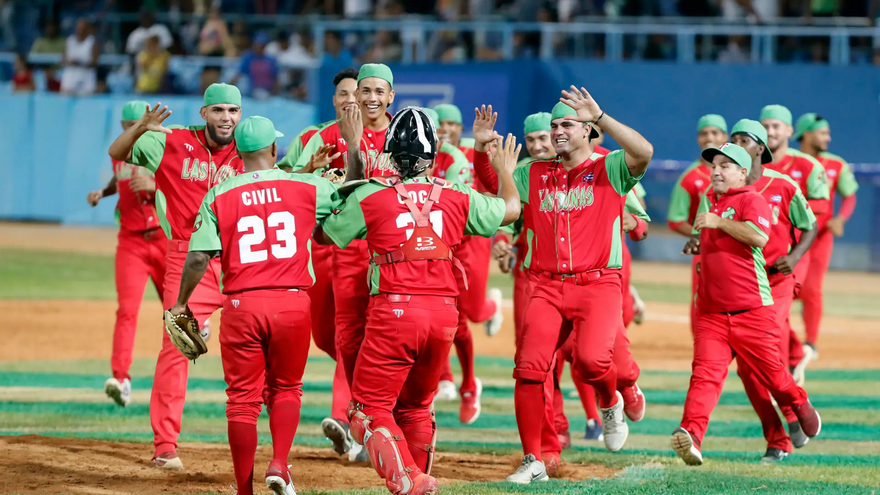
![]() 14ymedio, Madrid, 16 August 2023 — Just after the 62nd edition of Cuba’s National Baseball Series, with the victory of the Leñadores de Las Tunas, the newspaper Escambray published an analysis of the season in which, within limits, it doesn’t hesitate to clearly point out the serious problems that affect the national sport, which occur in full view of all Cubans without measures being taken to tackle them.
14ymedio, Madrid, 16 August 2023 — Just after the 62nd edition of Cuba’s National Baseball Series, with the victory of the Leñadores de Las Tunas, the newspaper Escambray published an analysis of the season in which, within limits, it doesn’t hesitate to clearly point out the serious problems that affect the national sport, which occur in full view of all Cubans without measures being taken to tackle them.
“A trend was set in previous campaigns, and most of the teams suffered from the loss of important players, not only because of emigration, but because many decided on other career paths. Baseball definitely does not guarantee a family a living,” says Elsa Ramos, author of the article and an award-winning journalist specializing in sports.
The text is published one day after the departure of Jaider Miguel Suárez, just 14 years old, to the Dominican Republic. It is not a mere coincidence; of the 20 Cuban players who participated in the U-15 World Cup in 2022, there are now 15 who have emigrated, an extreme situation since it is no longer only about the players who are at their best and looking for an opportunity abroad, but also about a future that they will never have in Cuba.
Escambray’s article speaks, precisely, of the under-23 players and the adolescents, whom they have to call on to cover the absences. They don’t have the “sufficient maturity,” which aggravates the situation in their respective categories. They not only can’t run but they also play badly, or “they can’t finish the season for logistical reasons.”
The author reviews some other nonsense that took place this season, such as the fiasco of the balls sent by the Italian company Teammate, barely mentioned in passing but remembered for their influence on the teams’ poor performance – one of the most embarrassing things of the year.
The company, linked to Riccardo Fraccari, president of the World Baseball and Softball Confederation (WBSC) and close to one of Fidel Castro’s sons, Antonio, sold the poor-quality balls at 12 dollars a unit to the regime. Seven months later and in the face of the avalanche of complaints and information in the independent press, they decided to open one and found that it was missing the core, as, in some cases, were the others.
“The unfortunate thing is that only at the end of the series and after complaints of all kinds did the National Commission release the information. The communication was lame, and [the information] didn’t come out as it should have at the Cuban baseball press conference,” reproaches the journalist.
“The prohibition by the winning team of a type of bat that was authorized for use during part of the season, and the “elimination of the clause that prohibits repatriation to play in the postseason, approved in the heat of the ’pressure’ for Yasmani Tomás to wear the blue uniform again [for the Havana team, the Industriales],” are also serious errors that add to the poor statistics of the National Series.
In summary, 288 offensive averages were reached (only 626 home runs), less than five fastballs per game and 969 defensive plays, “a figure that few leagues of respect exhibit,” she says.
As a whole, all these “deeds” affect the few remaining players, closing a vicious circle. “It puts back on the table,” adds Ramos, “the issue of how far such practices end up stimulating the emigration of athletes to the detriment of those who continue to bet on staying.”
As if that were not enough, public attendance was dismal, and not only, the journalist reasons, because of the “intense sun they played in because of the energy deficit in Cuba.” The reasons go beyond, and the players “didn’t manage enjoy playing enough to guarantee a better presence of the public, who were eager to enjoy the show.”
Before her paragraphs about the terrible season, Ramos mentions the good work of the champions, saying they deserved a victory, and she discusses the factors that led the Lildores to follow a style of play more attached to the Cuban tradition than to “the formulas of others.” But there are more shadows than light in her report.
Finally, the article ends with a warning of what is coming: the Pan American Games and other international tournaments in which numerous players from the province compete. On the other hand, there is the Second Elite League, which “seeks to attract the hearts of geographic proximity, although that will not be enough to overcome the first edition, which left much dissatisfaction.”
Last year, the competition made its premiere, but it left behind numerous troubles, among them another failure of Teammate, which didn’t send the kit on time, resulting in a postponement. Because they criticized the tournament, several official sports journalists were punished and excluded from the press conference, where explanations were given for the delay of the uniforms.
Translated by Regina Anavy
__________________
COLLABORATE WITH OUR WORK: The 14ymedio team is committed to practicing serious journalism that reflects Cuba’s reality in all its depth. Thank you for joining us on this long journey. We invite you to continue supporting us by becoming a member of 14ymedio now. Together we can continue transforming journalism in Cuba.
